Three quick observations from tonight’s special show on what life for Britain outside the EU would look like:
- Though most leading Leave campaigners have coalesced around a vision of Britain outside the EU single market (but enjoying, they confidently predict, free access to it), there is by no means a settled view among Brexiters about what the relationship between a post-Brexit UK and the EU would look like.Tonight former British ambassador to Warsaw and Leave supporter Charles Crawford suggested that a post-Brexit UK might have to accept freedom of movement of EU citizens as the price of staying inside the single market, explaining somewhat gnomically: “There’s a big omelette here and we’re not going to be able to turn it into 28 eggs.” I thinkhe meant it’s not going to be possible to change existing arrangements with the EU in a hurry.
- Although many Brexiters, like Daniel Hannan who made tonight’s film about what a post-Brexit might look like, are excited about the prospect of transforming the UK into a Hong Kong-style deregulated economy, there is real nervousness on the Leave side about alienating supporters of Brexit who value the kind of protections and rights that the EU has delivered. That perhaps explains why Andrea Leadson was keen to stress there would not be any watering down of worker protection laws post a Brexit: “In the area of employment law I wouldn’t expect to see deregulation.”
- When this referendum is over and pro-Brexit ministers return to their jobs, they are never going to be able to quote a Treasury prediction again. Andrea Leadsom, herself a former Treasury minister, was the latest minister to pour scorn on Treasury predictions tonight. “Generally economic forecasts are reliable for one thing,” she said. “And that is always being wrong.” I suspect it’s a quote she may be reminded of in years to come.
Getty Images
European empires come and go. Roman. Polish/Lithuanian. Holy Roman. French. Spanish. Ottoman. British. Only the Tsarist/Russian empire lingers on.
The European Union will not be around in its current form in 50 years’ time. Given Eurozone and migration tensions it could crash uncontrollably far sooner than that.
The original European Economic Community worked because six member states sat round a small table. Now with 28 EU members complexity overwhelms transparency: EU processes are undemocratic, if not illegitimate. Hence rising popular discontent. This is not politically sustainable.
A Leave vote opens the way to intelligent negotiation on controlled EU reform in a wider principled context.
Doom? Gloom? On the contrary, a huge improvement on the incoherent and increasingly unstable situation we all have now.
Charles Crawford is former ambassador to Poland, Serbia and Bosnia Herzegovina, and was a guest on the programme tonight.
Some countries can go it alone. The USA has such a big market (and firepower) that it can practically dictate the terms of its trade agreements with other countries. North Korea doesn't need them since it's closed to most of the world. But Britain is (and has been for centuries) an open trading economy. It attracts jobs and investors drawn to this English-speaking doorway to the EU and all its trading partners.
If Britain leaves the EU, it will suffer three consequences. First, it will lose foreign investment and jobs because new trade deals take an average of 28 months to negotiate - and that's too much uncertainty, for too long, for most investors. Second, the U.K. will become a rule-taker in trade negotiations. Like Switzerland in its recent deal with China, Britain will have to accept what larger partners have to offer. Third, the U.K. will lose its special access to the 60+ countries with whom the EU has agreements. In a slowing and intensely competitive global economy, these are serious handicaps to creating the jobs Britain needs.
Professor Ngaire Woods is dean of the Blavatnik School of Government and Prof of Global Economic Governance at the University of Oxford... and was a guest on the programme tonight.
BBC
We asked you to imagine how the UK might be if we vote to leave the EU... In just three words. Here are a few of your thoughts:
Andrea Leadsom brought up the example of Singapore’s speed in negotiating free trade agreements tonight – she said they managed to negotiate deals in an average of 22 months.
We’ve run a quick spot check, and that number seems plausible – or at least in the right ball park.
Singapore’s agreement with Japan started negotiations in 2000 and came into effect in 2002, China started in 2006 and came into effect in 2009, and Australia started in 2004 and finished in 2006.
Both sides of the debate might be particularly interested in Singapore’s agreement with the European Free Trade Association – negotiated and brought into effect in the space of 2 years from 2001 to 2003.
Outers might suggest that this shows Britain might be able to get a trade deal with the EU relatively quickly. But Remainers might hold it up as evidence that European institutions aren’t quite as slow in coming to trade agreements as the Brexiteers sometimes like to suggest.
(Source for negotiation times: Asia Development Bank)
Here is the piece from earlier in which Jonathan Powell, former Chief of Staff to Tony Blair, tries to persuade António Vitorino, former European Commissioner, that the UK should get a good deal outside the EU.
Here's Daniel Hannan's upbeat vision on what Britain might be like outside the EU.
BBC
It seems that our six one-hour specials have at least been helpful for our panel of undecided voters. The panel of "undecideds", recruited for us by pollsters Ipsos MORI, appear to have come down from the fence. Their verdict? It's a strong vote for Remain.
"It's a good panel," Chuka Umunna tells us.
But he would say that, wouldn't he?
The programme is now finished but we'll be live here with more analysis of the hour.
We've had to look online to what the opinion polls were suggesting in our first EU special way back on the 11 April. Back then, the rolling poll of polls by WhatUKThinks showed a split of Remain: 51%, Leave: 49% - so neck and neck.
The latest poll of polls shows Remain 54%, Leave 46%.
Given what happened in 2015, we have no idea if they're right. You can read more from WhatUKThinks here.
YouGov also had some interesting polling last week showing a clearcorrelation between education and attitudes to the EU referendum, which you can see below:
YouGov
This is interesting in itself, but also shows the methodological challenges for polling companies, as too many or too few graduates in their samples could make a big difference to the data. You can read YouGov's write up here.
I have three children... My views are all about their future. I believe their future would be brilliant outside of the EU
BBC
From the Norwegian point of view the EA agreement is much better than EU membership... but still in my organisation we want to get rid of the EA agreement... because by the EA agreement we had to accept a lot of the EU's laws and regulations.
There is a big part of the Leave campaign which is 'let's get away from a scary ghost'... That scary ghost was the European Union which was dreamed up 30 years ago... That's gone, there is no such European Union anymore. The European Union has been hugely modified over the past 30 years
If the UK chooses Remain in one month's time, it won't be a vote for the exact status quo.
David Cameron's renegotiation will mean changes. They include:
- A treaty change so the UK is not bound to "ever closer union" with other EU member states;
- An "emergency brake" on migrants' in-work benefits for four years when there are very high levels of immigration;
- Child benefit for children of EU migrants living overseas will be paid at a rate based on the cost of living in their home country;
- Protection for UK businesses to ensure they do not face "discrimination" for being outside the Eurozone
This could prove to be one of the most important parts of the debate. Polling shows a lot of voters are concerned about immigration from the European Union. But would quitting the EU mean we were able to reduce it? Or would any future trade deal mean the UK's borders will remain open?
You're going to have rules which apply to everybody... if you stay within the single market, the logic is you will have to carry on with some arrangement for free movement of people
So, can Andrea Leadsom imagine a post-Brexit Britain where freedom of movement continues?
Certainly not where free movement was completely uncontrollable... I think voters should think, from the Leave side, that we would not have uncontrolled immigration
It depends on what deal we get. The UK could continue to trade with the single market following an EU exit, but we do not know on what terms that trade would take place because that would be subject to years of negotiations.
Getty Images
It’s one of the biggest areas of contention. What happens to international borders in a post-Brexit Europe?
Would Brits landing in Benidorm find themselves diverted to lengthy visa-controlled queues alongside visitors from Africa and the Americas? Could the UK effectively close its doors to EU migrants, admitting only those deemed likely to fill key roles?
Cop out warning...
The truth is, we don’t know. It depends entirely on the divorce package.
Most people agree it’s very unlikely Britons would need a visa to visit EU countries as tourists.
But equally, a free trade agreement that did not also allow EU members to freely visit and work would be breaking new ground. You might have noticed when landing in UK airports that the UK/ EU passports section also says “including Switzerland and the European Economic Area”.
That’s because Switzerland, Liechtenstein, Iceland and Norway share free movement with the EU as part of their trade deals.
There’s also an ongoing – and unresolved – argument over what would happen to the UK’s border controls in Calais.
One thing we do know is that the UK has no plans to reintroduce border checks between the Irish Republic and Northern Ireland.
I've been negotiating for 40 years, in my opinion, this is one of the most difficult negotiating hands I've ever seen. There's a choice on one side between sovereignty, and on the other side access to the single market. I'm going to have to go back and tell the Prime Minister he's got to choose.
BBC
Getty Images
What would Brexit look like? Perhaps we should ask Greenland.
The world’s biggest island is the only territory to have quit the European project - so far - after its own referendum in 1982.
Comparisons should probably be made with some caution. After all, Greenland is more than three-quarters ice cap, its population is smaller than Grimsby's and its only real industry is fishing.
Perhaps one thing we can conclude from the original "Grexit" is that leaving is incredibly complicated. It took Greenland three years to negotiate its departure.
Former cabinet secretary Lord O'Donnell cited it as evidence that a Brexit would take much longer than the stated two years.
On the other hand, the multi-billion value of UK-EU trade makes reaching a deal much more of an imperative. And the UK has about seven civil servants for each person in Greenland, so you might think they’ll be able to get a deal done a bit quicker.
Getty Images
Take out the politics, thunderous arguments and exhaustive negotiations, there is a formal process in place for agreeing a Brexit.
It’s untested and quite new – until 2007 joining the EU was assumed to be a one-way ticket. But now we have Article 50 of the Lisbon Treaty, which boils it all down to two simple steps:
- The Prime Minister writes a letter informing the President of the European Council of the UK’s intention to quit
- The council appoints a negotiating team, and a two-year window opens for negotiating a withdrawal treaty
That two-year window could be extended to three years if necessary. Any further extension would need all member states to agree. But that two or three-year countdown would only begin once David Cameron’s letter had been formally received by the Council.
Shockingly enough, how smoothly these negotiations will go depends on who you ask.
European Commission President and Brexit bogeyman Jean-Claude Juncker has warned the EU won't be fighting with "kid gloves". Some commentators point to imminent national elections in France and Germany, where incumbent parties are being buffeted by upstart nationalist and anti-EU parties.
Others are more bullish, pointing out that the EU will want to retain its trade and diplomatic links with the UK – and the UK will be armed with an enormous mandate from its people.
A big part of a reporter’s job is being anti-social. Cornering people in pubs and at parties, like the worst sort of guest, then sloping off into the night with information. One question I’ve been putting to senior government officials of late is the question of what “Out” looks like.
The fact that I’m doing this is, itself, indicative of problems for the Leave campaign. They cannot bind the government to negotiate in any detail. If they win, it is left to the government to sort out.
That matters. As Roland Smith, a thoughtful pro-Brexit blogger, has written: “A Leave vote is simply advising the government that we want to leave. It is then for the governing Conservative party, over half of whom are Remainers, to come up with a way out that works and can be supported by the even more Remain-centric House of Commons.”
That is why finding out what the policymakers on all sides think might happen is so important. For what it’s worth, I think Mr Smith’s essay on what he calls "a liberal case" for Brexit is quite a good primer on a likely turn of events. The path he maps out is one that some have suggested.
He writes: "We would likely first move to a single market position outside the EU using the EEA framework as a model… The journey would continue from there, ending in a position as a regional player in the global single market, leveraging our historic connections around the world.”
This is not the Vote Leave position. They want greater distance from Europe as the first step, but believe we would be able to resolve deals elsewhere and a bespoke deal with Europe rapidly. But this highlights one of the oddities of this referendum: who exactly can promise what?
Right, so we’re off to another imaginary scenario of a post-Brexit future.
Jonathan Powell, diplomat and former Chief of Staff to Tony Blair, is trying to persuade Antonio Vitorino - a former European Commissioner from Portugal - that the UK should get a good deal.
Given that Powell supports our membership of the EU, we can assume that in his version of the future these negotiations won’t be quite as rosy as Dan Hannan’s.
BBC
In the first and second episodes of this series I was feeling really upbeat about leaving the European Union. Since then, I've noticed it's been increasingly difficult to get anybody to substantiate their claims
I just remember when I was a shadow Business Secretary and I went on a trip to Beijing, I met with parts of the Chinese government as you do. They said to me "Mr Umunna, why is it that there are some people in your country who want to leave the European Union, because when you're negotiating with us... you're sitting on one side of the table with half a billion other people and you're negotiating with our 1.3 billion people in China, why do you want to go and sit in the corner on your own with your 65 million people?
BBC
If everyone in the world believed in the free market as a matter of religious faith Britain might have a chance. But that's not how trade negotiations work... and that's why Britain as part of a European market of 500 million has passed some very successful trade deals with more than sixty other countries
BBC
To be clear, the UK wouldn’t necessarily have to agree to a “Norwegian option” - or anything like it.
One of tonight’s guests, Andrea Leadsom, thinks we can do a lot better – creating a “British option”.
The EU has many agreements with other countries. Bosnia, Serbia,Albania and Ukraine have favourable trade agreements, although they’re mainly intended to boost their economies because they want to join the EU.
And Canada is wrapping up its much-discussed trade deal with the EU. It has taken seven years, runs to 1,400 pages, and contains many unresolved issues about compliance with EU rules. It also means Canada will have to comply with EU regulations without having any say over them.
On the other hand, it does not have to agree to free movement and it can continue to make trade deals with anybody else.
The backstop option if nothing else is arranged is simply for Britain to be a member of the World Trade Organisation. There'd be no privileges from the EU - but no concessions either.
The sorts of areas that the UK could do so much better in is negotiating for free trade agreements with other parts of the world, the 2.3 billion in the Commonwealth
But Chuka Umunna doesn't agree
Look at Pakistan and Jamaica, we have the benefit of trade deals through the EU with those Commonwealth countries
BBC
Kathrine Kleveland
Norway voted no to EU-membership through referendums in 1972 and 1994. We are still satisfied and happy outside the EU. For 11 years, every single poll has shown a no-majority. Our main argument is sovereignty and democracy. The centralized EU is not democratic.
We recognize the scaremongering from our own EU debates, but "project fear” failed. The pro-EU campaign claimed that 100,000 jobs would be lost and that investments in Norway would dry up. More than 20 years later, we know that unemployment rates in Norway went down, and have since been consistently lower than in the EU.
Post-Brexit, the UK will, of course, get a trade agreement with the EU. Both UK and the EU will want it and need it. Even the EEA agreement is way better than EU-membership. Norway is only part of the Single Market, not the political union.
I´m certain you will do better as a free country outside the EU, with your own economy, making your own laws, and being a prosperous country in the international community. We look forward to celebrating the leave victory with you!
Kathrine Kleveland, leader of No to the EU in Norway, and a guest on the programme tonight
BBC
Tonight we are also joined by a glittering panel of experts, who will provide a check on the claims made by our political guests, and hopefully offer answers to some of the questions posed by our undecided voters…
In the Remain camp:
Professor Ngaire Woods (it's pronounced Nyree) is dean of the Blavatnik School of Government and Professor of Global Economic Governance at the University of Oxford.
Peter Sutherland, international businessman and former Attorney General of Ireland.
And in the Leave camp:
Charles Crawford, former ambassador to Poland, Serbia and Bosnia Herzegovina. Fun fact! Charles speaks (to varying degrees) Serbian/Croatian/Bosnian, Polish, Russian, French and Afrikaans
Katherine Kleveland, leader of the 'No to the EU' Party in Norway.
The problem with many of the leave campaigners is that they paint this vision which is one with a deregulated employment market... It is one where we are probably going to get increased tariffs...
We'll have more on this later. Chuka is pointing out that free trade agreements do come with a substantial cost. It's a negotiation. If it's not free movement, as with Norway, Switzerland et al, it will be something else.
If we vote to leave we will have a £10 Billion a year independence dividend. That is as much as Sir Simon Stephens says the NHS needs during this parliament
The Leave campaign has been hitting hard recently on its attempt to link EU spending to problems in the NHS - despite NHS bosses, past and present, backing Remain. Andrea Leadsom is not letting up on that strategy.
Dan Hannan just said that in his Post-EU Britain we operate in a free trade area stretching as far as the eye can see. Or at least from Iceland to Turkey. But is that possible?
Well, Michael Gove has said that being part of the European free trade zone would mean access to ‘European Market’ without the hindrance of European Regulations. But the ‘European Market’ is more than just one block of countries; it is a series of trade deals between multiple states, in and outside the EU.
In order to trade from Iceland to Turkey, the UK would need to make a deal with the 28 member states of the EU, the countries in the European Economic Area (Norway, Iceland and Lichtenstein) and any other state which we can now trade with because of a bi-lateral trade deal with the EU (Turkey, Russia, Ukraine and Switzerland)
Which we could do.
But we might have to give something back to the EU to get that trade deal. For instance, the German and French governments have made it clear that if we want to be in the single market we need to accept free movement of people. So we may end up near to where we started.
There’s a full fact check here
Are there losers? Some. The megabanks and multinationals that had spent years lobbying the EU to get rules that suited them and hurt their rivals now face competition from innovators and startups
Hannan goes on to suggest that MEPs like himself will find themselves unemployed. That’s a price worth paying, he suggests.
We’ll be returning to a parallel future in a bit, but for now, back to the studio...
BBC
The growth, after all, is across the oceans. Every continent has grown over the past decade except Antarctica and Europe. When we joined in 1973, the 28 states that make up the EU accounted for 36% of the world’s economy. Today it’s 17% and falling
There’s pretty good reason for that to be the case, according to the BBC’s Reality Check team. About half the change can be explained in terms of population - the EU’s share of global population is under 7%. In 1973 it was over 11%.
And much of the rest of the world has been catching up from a much lower starting point. It’s not that surprising that developing countries have grown more quickly.
BBC
I think they've probably got it about right..and that's an unusual thing for a Labour politician to say about a conservative run Treasury
As if this new world of Blue-on-Blue, Red-on-Red, Minister-on-Minister politics wasn't confusing enough...
A serving minister tells us the Treasury's report is bunkum, the opposition tells us they've got it spot on.
“The only question people ask these days is why it took us so long" says Tory MEP Dan Hannan from his post-Brexit future.
Hannan suggests we’d become a world leader in biotech, law, services and medical research with booming financial services.
This is all rather different to the Treasury report today. What’s George Osborne up to in this alternative future?
BBC
Arguing for the Remain camp tonight is one-time Labour leadership candidate, former Shadow Business Secretary, and serious Europhile, Chuka Umunna.
Despite acting as a spokesperson for Better in Europe, Umunna has largely kept his head down during the referendum campaign. That said, he has made some notable exceptions. He has been vocal in his criticism of Nigel Farage, last week accusing the UKIP leader of showing “shades of Enoch Powell”.
Most recently he attacked the Leave campaign’s immigration policy, suggesting a vote to leave the EU would damage the economy and send Britain back into a recession.
BBC
In the Leave corner tonight is the Conservative member for South Northamptonshire, who has served as the Minister of State at the Department of Energy and Climate Change since leaving the Treasury in May last year.
Leadsom came to particular prominence during the Libor scandal in 2012, when she robustly questioned Bob Diamond (her former boss at Barclays) during a select committee hearing. She was widely credited for getting to the bottom of the scale of the mismanagement of risk in banks. Her experience in the financial sector and in the Treasury makes her a trusted voice on economics within the Leave camp. She most recently weighed in on the Governor of the Bank of England intervention, calling his speech “incredibly dangerous” and accusing him of disrupting the markets and jeopardising his independence.
A committed Eurosceptic, Andrea was a founding member and leader of the Fresh Start Project seeking reform of the UK's relationship with the European Union.
BBC
Today Chancellor George Osborne, armed with a new Treasury analysis, warned quitting the EU will tip the UK into a recession.
Energy Minister Andrea Leadsom, who used to work in the Treasury, tells us: "Economic forecasts are absolutely reliable for one thing - they are always wrong."
As ministers fall over themselves to question official forecasts - and each other - it's worth pondering for a moment how on earth our government ministers will ever get back to expecting us to listen to them.
Snacks at the ready? Our final Referendum special is now underway.

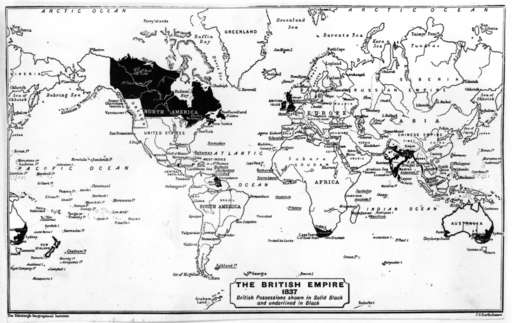
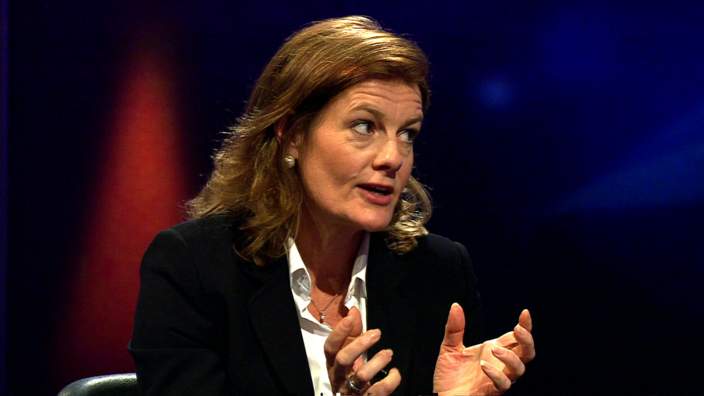
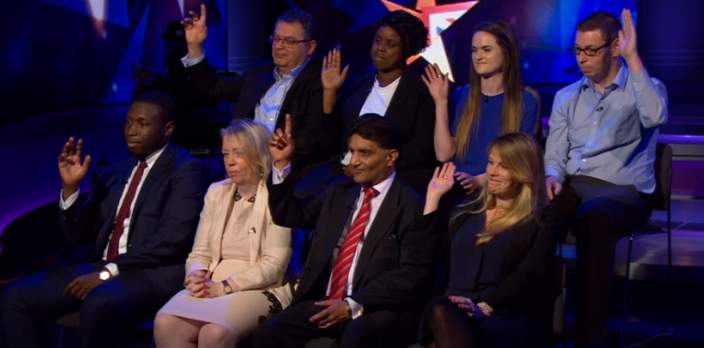
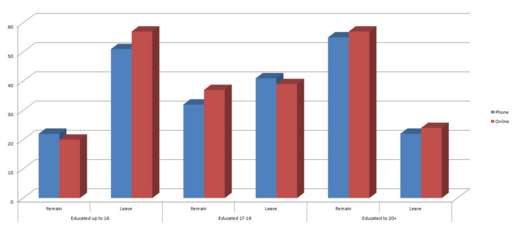
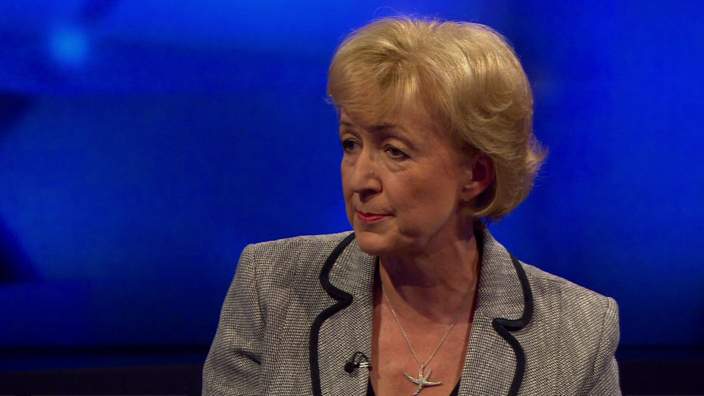


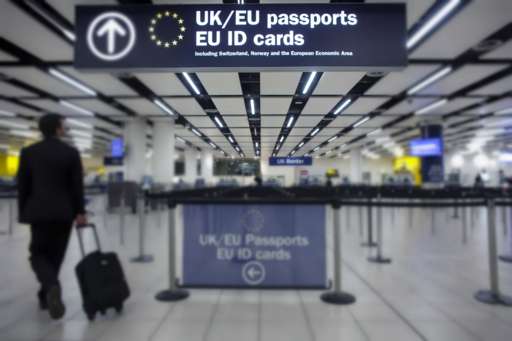
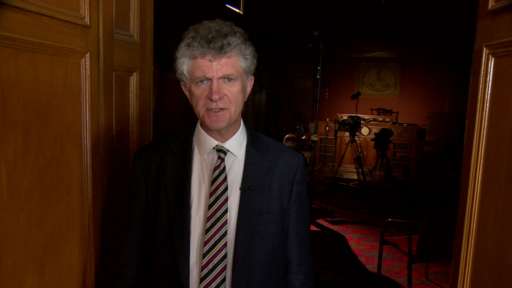
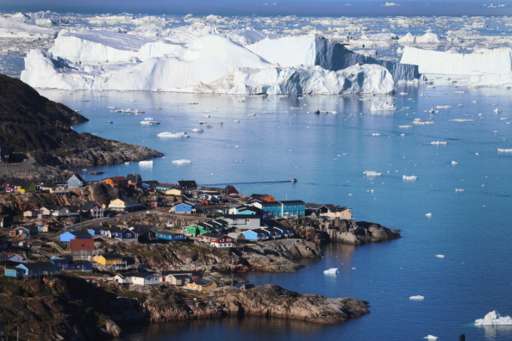
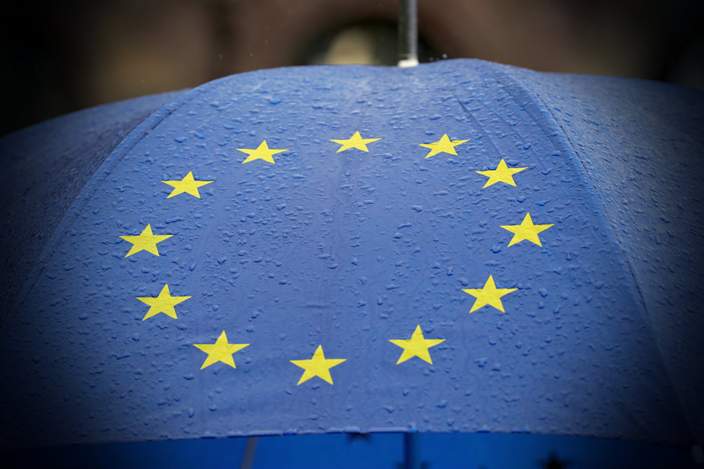

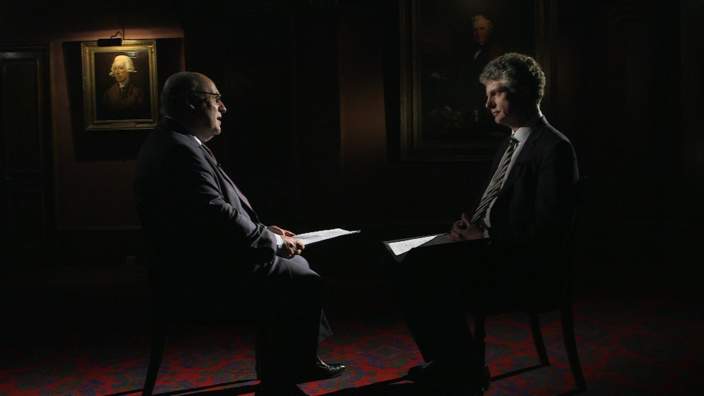
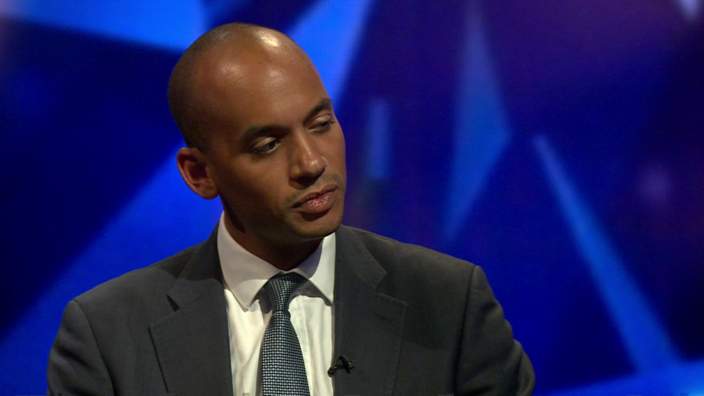
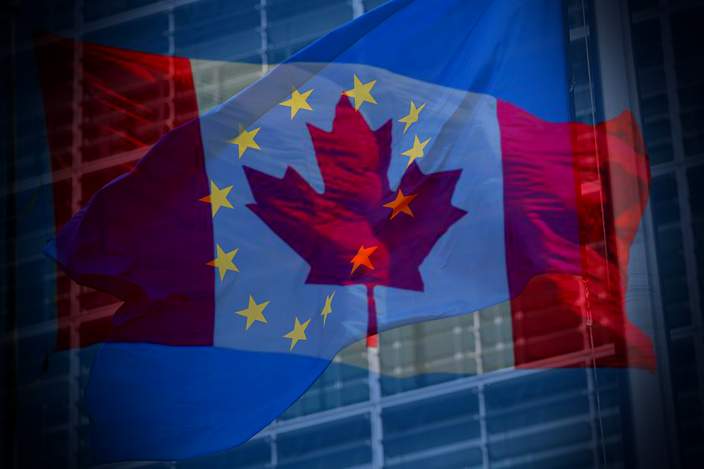
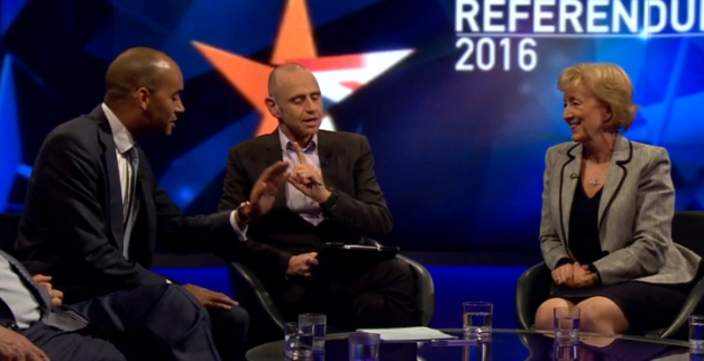
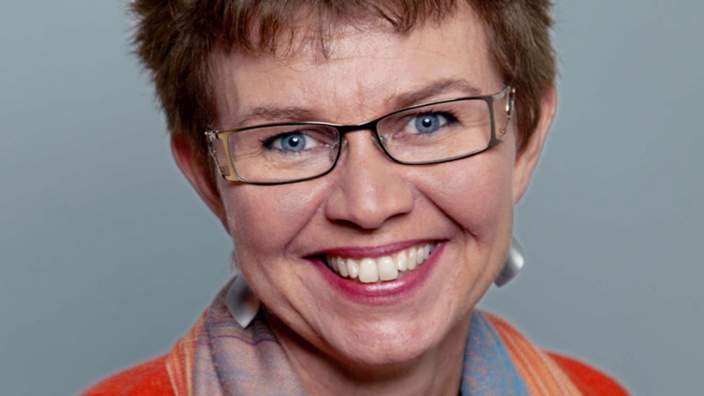
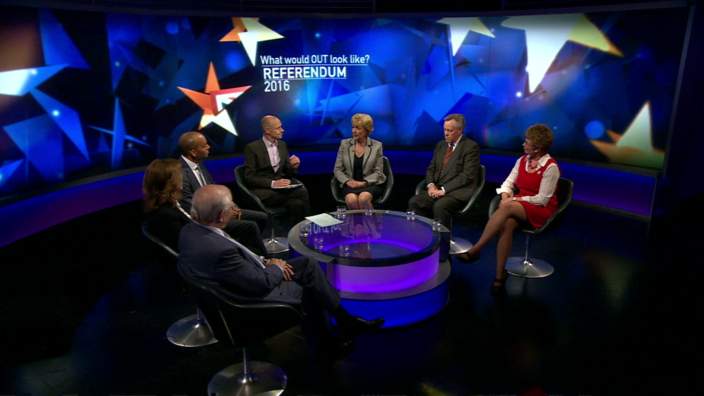
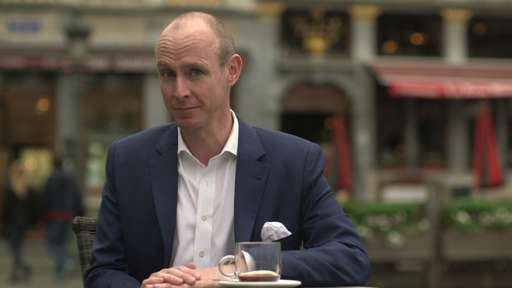
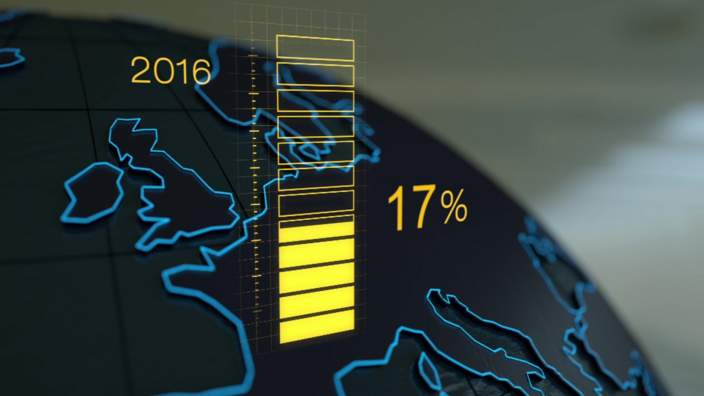
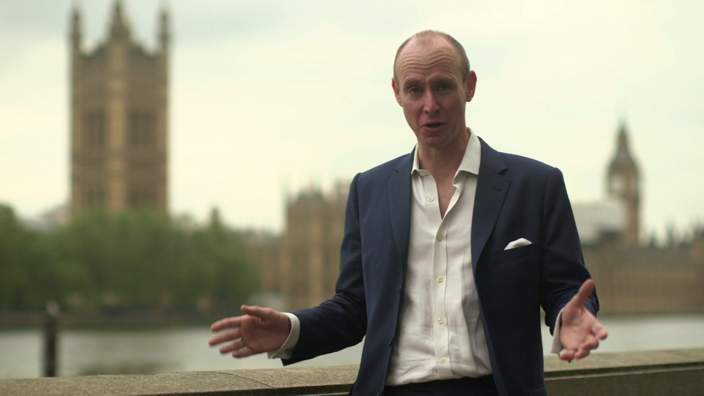
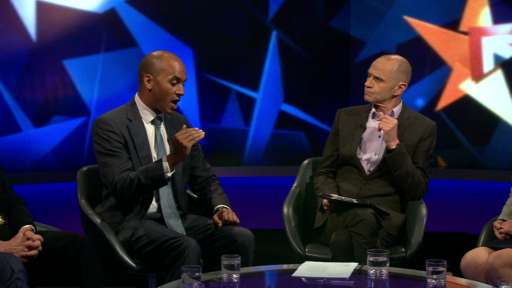
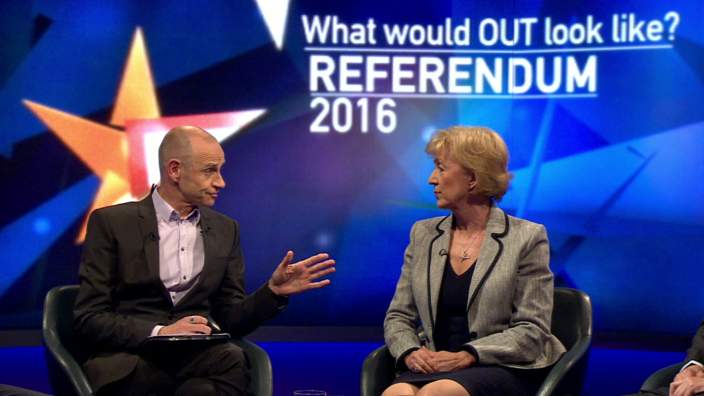
No comments:
Post a Comment